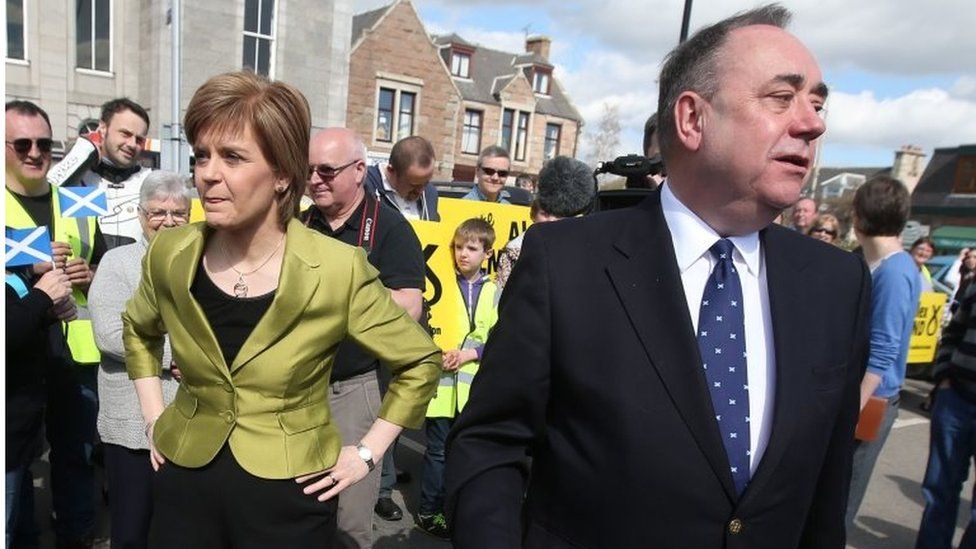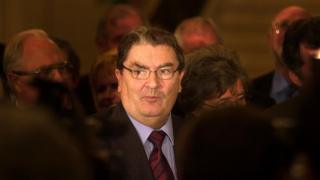
By Nick Eardley
BBC political correspondent
image copyrightPA Media
In the next few weeks, the two most prominent figures in SNP history will give evidence at a Holyrood inquiry into how the Scottish Government handled harassment allegations against the former Scottish First Minister Alex Salmond.
Mr Salmond has accused Nicola Sturgeon of misleading the Scottish Parliament and breaching the ministerial code.
Ms Sturgeon’s spokesman has accused Mr Salmond of spinning false conspiracy theories.
The row could have significant implications for Scottish politics.
“He’s trying to bring the house down.”
That was the conclusion of one of Ms Sturgeon’s close allies shortly after it emerged Mr Salmond was publicly accusing her of misleading the Scottish Parliament and breaking the ministerial code.
-
Salmond accuses Sturgeon of misleading parliament
- Battle lines drawn again over Scotland’s future
- How secure is Nicola Sturgeon’s future?
For months, some around Scotland’s first minister hoped Mr Salmond would hold back from directly criticising Ms Sturgeon in a way which could threaten her job.
They believed directly attacking Ms Sturgeon would alienate supporters of Scottish independence – something Mr Salmond would want to avoid.
That calculation changed with Mr Salmond’s submission to an inquiry into whether Ms Sturgeon broke the ministerial code.
Some around the SNP leader now fear the next few weeks could be bloody.
How we got here
The picture above was taken days before the referendum in 2014, when Mr Salmond and Ms Sturgeon were the dream team of the independence movement.
For a decade, as leader and deputy leader, they had dominated nationalist politics.
When Mr Salmond stood down, there was no question of who would take over: Ms Sturgeon was the natural successor.
That relationship has collapsed completely as a result of allegations of sexual harassment made against Mr Salmond.
When the complaints emerged, Mr Salmond successfully took Ms Sturgeon’s Scottish Government to court over its flawed process for investigating him.
Mr Salmond’s victory cost the taxpayer £500,000.
Now, Ms Sturgeon is facing questions, most prominently from Mr Salmond, about why the Scottish Government didn’t admit problems with its process earlier – and whether she misled the Scottish Parliament on when she first found out about the allegations.
The meeting
Ms Sturgeon says she forgot a meeting she held with a former Salmond aide, days before she met Mr Salmond privately at her home.
She has said she first found out about a complaint against Mr Salmond, being investigated by her Scottish government, on 2 April 2018.
That meeting took place in her home and wasn’t recorded.
But it’s since been claimed Ms Sturgeon was told a few days earlier at the Scottish Parliament by Mr Salmond’s former chief of staff.
That’s raised questions over what Ms Sturgeon knew, why she met Mr Salmond privately and why it wasn’t recorded as official government business.
My colleague Phil Sim has written about the ins and outs of meetings here.
‘Misled’
There are two inquiries into the Scottish Government’s alleged mishandling of complaints against Mr Salmond.
One is by James Hamilton, the first minister’s independent adviser on the ministerial code, into whether she has breached it.
The second is a cross-party Holyrood inquiry into how her government handled complaints about Mr Salmond.
In a remarkable seven-page submission published earlier this month, Mr Salmond accused Ms Sturgeon of holding positions which are “simply untrue”, “manifestly untrue” and untenable”.
“Parliament has been repeatedly misled,” Mr Salmond contests.
Mr Salmond believes he was treated unfairly by the government he used to lead.
There are many in the SNP – including a small but loyal group of elected politicians – who agree and believe there was a conspiracy against him which could lead to several key officials in the Scottish Government standing down.
Some include Ms Sturgeon in that group.
‘False conspiracy theories’
Ms Sturgeon says this is all nonsense and denies breaking the ministerial code.
Her spokesman has accused Mr Salmond of trying to deflect from complaints made by women about his behaviour – and accused her former mentor of “spinning false conspiracy theories”.
In Ms Sturgeon’s words: “I have faced accusations of ‘conspiring’ against Alex Salmond and also of ‘colluding’ with him. I reject in the strongest possible terms both of these suggestions.”
If there is another referendum on Scottish independence, it is all but impossible to see the 2014 “dream team” working together again.
But this isn’t just a story about the fallout between two giants of Scottish politics.
It could have ramifications for the future of the SNP, independence and Ms Sturgeon herself.
Sturgeon on trial?
Nicola Sturgeon’s political opponents have struggled to land any political blows in recent months.
Polls suggest support for the SNP is as high as ever – and that backing for Scottish independence has been rising.
Although there have been criticisms of the Scottish government’s handling of the pandemic, the evidence suggests Scots are happy Ms Sturgeon is making the decisions – and not Boris Johnson.
To many in Scottish politics, it appears the biggest threat to Ms Sturgeon’s position now comes from her predecessor.
Mr Salmond’s claims his one-time protégé failed to tell the Scottish Parliament the truth – and that she broke the ministerial code – are serious.
Ms Sturgeon completely denies them, but in normal times such a breach of the code would lead to a resignation.
The code is clear: “Ministers who knowingly mislead the parliament will be expected to offer their resignation.”
Ms Sturgeon’s political opponents have insisted that if she is found to have breached the code, she will have to stand down.
Privately, although they’re confident it won’t come to that, some around the first minister admit she would not be able to survive such a finding from her adviser on the code.
Many senior figures in Scotland in the devolution era have resigned for less.
There is a discussion over when Mr Salmond will give evidence to MSPs about his claims.
But it is clear he has decided not to hold back in his criticism of the first minister and the civil service – and that could prove dangerous for the Scottish Government.
One senior SNP politician was frank; they thought Mr Salmond would try and bring Ms Sturgeon down in the coming weeks.
“He’s trying to take down a first minister who is tremendously liked and respected”.
Is the first minister in trouble?
There has been a lot of head-scratching among opposition parties in Scotland about how to gain ground on the SNP.
Frankly, nobody really seems to have an answer.
But for months, well connected opposition figures have talked about this inquiry being a moment of real danger for Ms Sturgeon’s leadership.
Some think it could bring her down – others that even if it doesn’t, it will raise serious questions about her honesty.
But while many in Scottish politics discuss Ms Sturgeon’s future – very few people are confidently predicting her demise.
The main reason is the pandemic.
Ms Sturgeon has extremely high approval ratings for her handling of coronavirus.
Scots seem to approve of the way she is trying to deal with the health emergency – and some believe voters would forgive a breach of the rules in the midst of a crisis.
It’s a view I’ve heard from Ms Sturgeon’s critics as much as her allies; that these are not normal times and the normal rules of politics don’t apply.
Mr Salmond’s supporters are reluctant to speak on the record.
I’m told that some elected parliamentarians are afraid of the backlash they would get if they did.
But one source said: “I think in normal times she would be a goner. But I don’t think she is a goner because people are rightly focused on the pandemic and her handling of the pandemic has been great.”
The second is independence. Ms Sturgeon has led the SNP and the independence movement to a point where successive polls have suggested support for leaving the UK is now a majority view.
There have been criticisms from some in the SNP about a lack of strategy to force another referendum, but most accept the first minister is a key asset for the independence movement.
That makes it less likely Mr Salmond’s allies would – or could – force her to stand down.
If the SNP lost its leader and key asset, that could have an impact on support for independence.
Whilst a number of names have been discussed, there is no certain successor – definitely not with the same UK and international profile.
Mr Salmond’s evidence to the Holyrood inquiry will be a remarkable moment in the history of the SNP; the leader who took the party to the brink of independence accusing the leader who could deliver it of misleading Parliament.
Even if Ms Sturgeon survives, Mr Salmond’s allies believe others may be “toast”; including senior civil servants and advisers.
But senior allies of Ms Sturgeon still appear confident she will lead them into the next Scottish election and beyond.
One concluded: “Is she going to get through this? Yes she is.”
Related Topics
Source link

